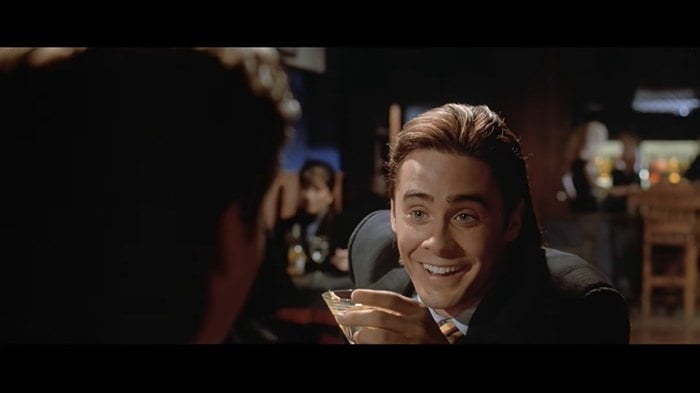The ending of the movie American Psycho is a complex and multi-layered sequence that raises questions about the nature of reality, the protagonist's mental state, and the overarching themes of the film. American Psycho follows the life of Patrick Bateman(Christian Bale), a wealthy and successful investment banker living in Manhattan during the 1980s. At first glance, Bateman appears to be the epitome of the American Dream – he's a charismatic and handsome man with a lavish lifestyle, designer clothing, and a meticulously groomed appearance. However, beneath his polished exterior lies a deeply disturbed and homicidal personality.
Plot Summary
The film delves into Bateman's double life – the facade of the well-groomed and successful Wall Street professional, and the psychopathic serial killer who revels in torturing and murdering his victims. As the narrative progresses, the audience is confronted with increasingly gruesome scenes of violence, all perpetrated by Bateman.
The Ending Explained
The ending of American Psycho is a critical and enigmatic culmination of the film's exploration of Bateman's descent into madness, the shallowness of consumer culture, and the blurred lines between reality and delusion. The ending of American Psycho centers around a pivotal scene in Bateman's upscale Manhattan apartment. By this point in the film, Bateman has reached a state of heightened agitation and a complete breakdown of his carefully crafted facade. He is unable to contain himself any longer and begins confessing his gruesome crimes to his lawyer, Harold Carnes, portrayed by Willem Dafoe.
Bateman's confession is a chilling and detailed monologue where he describes the murders he has committed, his victims, and the sadistic pleasure he derived from these acts. He provides graphic and horrifying accounts of the brutality he inflicted on those unfortunate enough to cross his path. However, the turning point in the ending occurs when Carnes responds to Bateman's confession. Instead of reacting with shock, horror, or urgency, Carnes adopts a skeptical and dismissive tone. He views Bateman's confession as a morbid joke, a desperate cry for attention, or even a narcissistic ploy for manipulation. Carnes implies that Bateman is a notorious liar and a self-absorbed attention-seeker who thrives on fabricating elaborate stories to shock and manipulate those around him.
Carnes' reaction introduces a profound layer of ambiguity into the film's conclusion. The audience is left to grapple with the question of whether Bateman's confession is legitimate or if it's a product of his deranged imagination. Carnes' skepticism challenges the credibility of Bateman's narrative, making it increasingly difficult to discern what is real and what might be a figment of his psyche.
This moment of doubt amplifies the film's central theme of the dehumanizing effects of consumerism, materialism, and social conformity. It raises questions about whether the callous and self-absorbed society Bateman inhabits is simply indifferent to the horrors he has committed. Perhaps, in this interpretation, his confession is genuine, but the society is so shallow and morally bankrupt that it fails to recognize or acknowledge the atrocities he has described.

As the scene progresses, Bateman exits Carnes' office, but the ambiguity does not end there. The movie's final moments unfold outside Bateman's office building. He encounters one of his acquaintances, Paul Owen, played by Jared Leto. The twist here is that Bateman believes he has killed Owen earlier in the film. However, Owen is very much alive and well, leading to a disorienting and perplexing turn of events.
The reappearance of Paul Owen shatters Bateman's sense of reality and introduces another layer of uncertainty. It raises the question of whether Bateman's murders are genuine, or if he is trapped in a nightmarish world of delusion and hallucination. Did he truly kill Owen, or did he merely imagine it? This puzzling turn of events complicates the film's narrative even further.
Interpretations of the Ending of American Psycho
The ending of American Psycho can be interpreted in multiple ways, adding to its enduring fascination. Some viewers may argue that Bateman's murders are indeed real, and his confession is sincere. The skepticism of those around him, like Carnes, reflects the film's commentary on the apathy and moral bankruptcy of Bateman's world.

Others might contend that Bateman's violent acts are metaphorical rather than literal. In this reading, his murders serve as allegories for the dehumanizing consequences of capitalism and consumerism, and his inability to be held accountable underscores the moral emptiness of the society in which he resides.
Furthermore, Bateman's encounter with Paul Owen, whom he believed he had killed, could be seen as an embodiment of his deteriorating mental state. It suggests that his grip on reality has slipped, and he is increasingly unable to differentiate between actual events and his delusions. This interpretation underscores the film's exploration of the blurred lines between sanity and madness.






